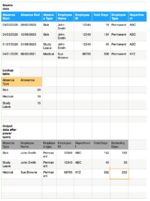Hi
I have the below Power Query that helps me group absences for each employee. I wanted to find out how to limit the Total Days value (highlighted below) to 262.
= Table.Group(Source, {"Absence Type", "Employee name", "Employee Type", "Employee ID", "Department"}, {{"Total Days", each List.Sum([Total Days]), type number}, {"Excluding Days", each List.Sum([Excluding Days]), type number}})
Thanks
I have the below Power Query that helps me group absences for each employee. I wanted to find out how to limit the Total Days value (highlighted below) to 262.
= Table.Group(Source, {"Absence Type", "Employee name", "Employee Type", "Employee ID", "Department"}, {{"Total Days", each List.Sum([Total Days]), type number}, {"Excluding Days", each List.Sum([Excluding Days]), type number}})
Thanks






